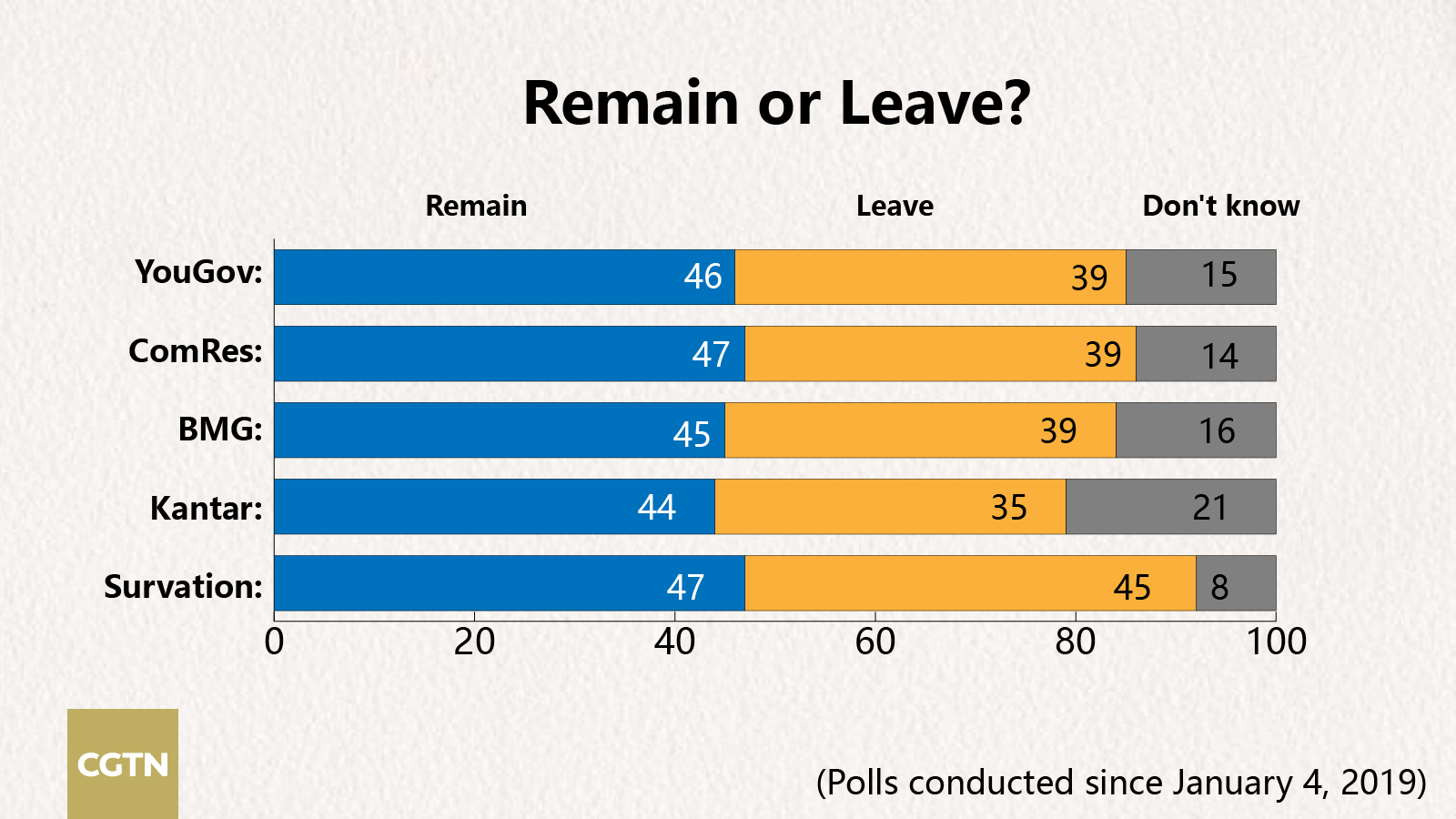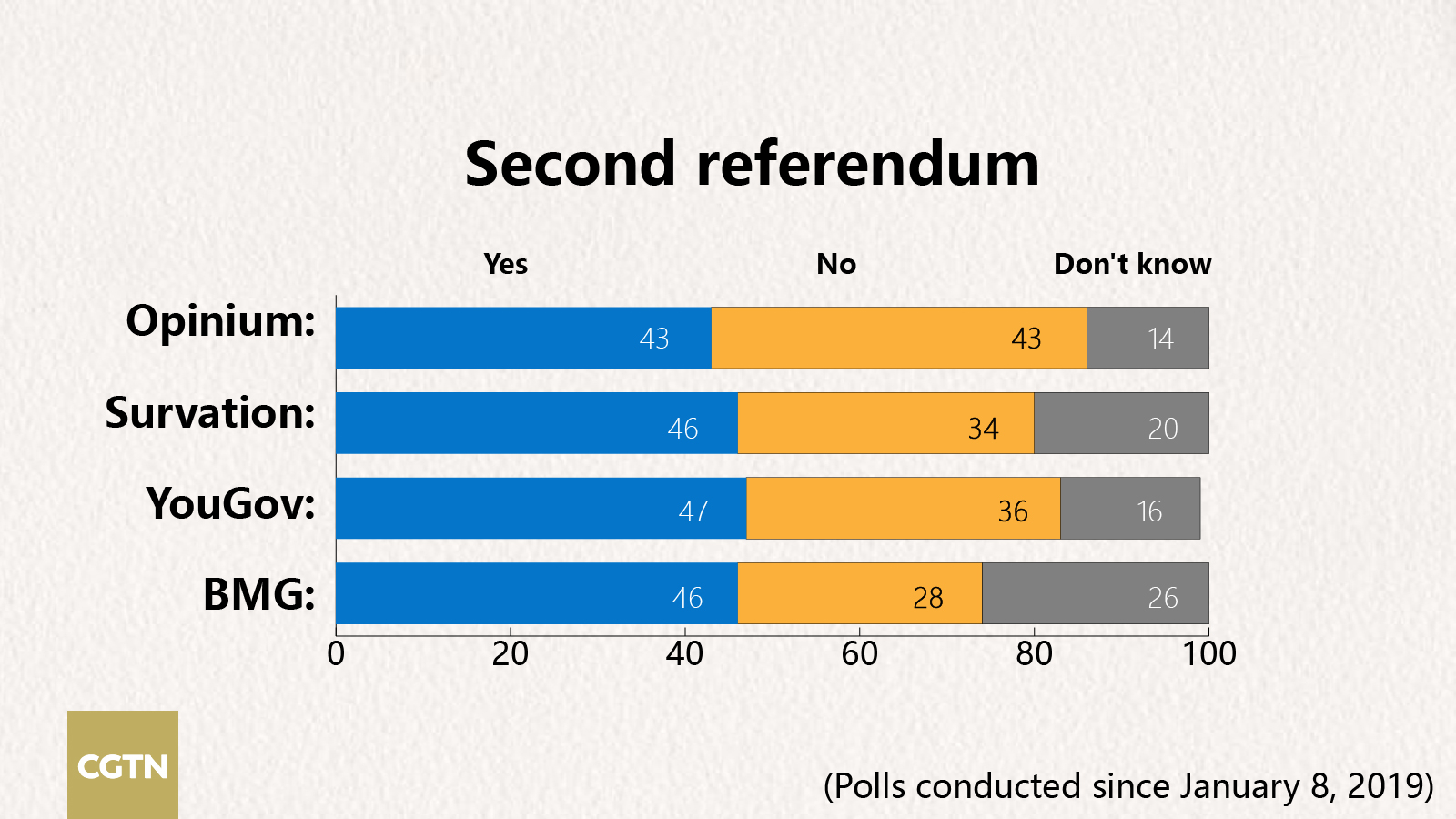British Prime Minister Theresa May will outline her Brexit "plan B" proposal on Monday, with different factions in parliament set to lay out an array of possible alternatives.
As MPs squabble over a May deal 2.0, alternative deals, a no-deal, a second referendum, an election or a Brexit delay, what does polling suggest the British people make of the Brexit chaos?
Remain or Leave?
In June 2016, 51.89 percent of Britons voted to leave the European Union and 48.11 percent voted to stay, but a series of recent polls indicate this has now reversed.
The latest poll from YouGov gives Remain a 12-point lead, 56-44 (when "don't knows" are removed), the largest margin since the referendum. And it is backed up by ComRes, which puts Remain up by eight points, 54-46, also without undecideds.

Would British voters now choose to leave or remain in the EU? /CGTN Graphic
Why the shift? Much has changed since 2016 – notably, the realization that Brexit is far from simple – but demographic trends also play a role.
YouGov analysis has found that Britain would likely opt to stay in the EU from January 20, 2019 if no one switched their vote – simply because enough Leave voters would have died and enough likely Remain supporters would have reached voting age.
Second referendum?
The pro-Remain movement post-referendum has been dominated by the People's Vote campaign, and momentum behind a second referendum grows as the deadlock in parliament deepens.
Polling indicates that Britons now broadly back a second referendum: YouGov by an 11-point margin, Survation by 12 points, BMG by 18 points (all including undecideds). Opinium puts "yes" and "no" neck-and-neck at 43-43, with 14 percent undecided.

Do British voters support a second Brexit referendum? /CGTN Graphic
May maintains that a "People's Vote" would cause "irreparable damage" and Labour leader Jeremy Corbyn avoided mentioning it in two Brexit speeches last week, despite YouGov polling showing 78 percent of his party's membership back a new vote.
Supporters of another referendum argue nothing could be more democratic than asking the people again." If it were to happen, the next question would be: What is the question?
Detractors say the decision has been made, and asking the people again would be undemocratic. YouGov polling backs this position – again illustrating the complexities of Brexit – with 47-39 saying a second referendum would not be democratic.
Is any deal 'good'?
May's Brexit deal was crushed in parliament last week, and polls suggest its unpopularity among MPs is shared by the public.
Nevertheless, her "plan B" isn't expected to feature many changes from the defeated deal. There is a growing expectation that she will again seek to appease hardliners, and try to run the clock down in the hope time pressure will lead to support for a slightly modified version of her plan.

What do voters think of Theresa May's Brexit deal? /CGTN Graphic
A YouGov poll ahead of last week's vote put public support for the deal at 23 percent, with 49 percent against. Survation found 41 percent opposed and 34 percent in favor.
In an Opinium poll published on Sunday, responders said they would vote to stay in the EU rather than back May's deal by a 45-35 point margin if given a binary choice.
Voters are as split as MPs when choices are put before them though, with YouGov polling showing four options – no-deal, May's deal, customs union and single market access, referendum and remain -- are all seen as more "bad" than "good."
General election?
The opposition Labour Party – split over Brexit – has built its policy around forcing a general election, which it tried to do last week by holding a no-confidence vote in the government.
The attempt to remove the government failed, and YouGov polling ahead of vote indicated a preference for the government to remain in office by 48-29.

How would British voters cast ballots in a general election? /CGTN Graphic
Polling suggests that the Conservatives would be in a reasonable position electorally despite their vote share dropping against the 2017 general election result.
Of the most recent results from four leading pollsters, two give the Conservatives a lead and two put Labour ahead – indicating that if a general election were held now, another hung parliament is the most likely result.
The polls also suggest respective four-point rises in support of the pro-European Liberal Democrats and the anti-EU UKIP, when measured against the 2017 election. If there is a snap election and a hung parliament, the success of these smaller parties will be important to Brexit's future direction.
So what do Britons think?
The polling industry in Britain took a lot criticism after the 2016 referendum and 2017 general election, but trends on key issues are now broadly consistent across major pollsters.
Polls in January generally indicate that: The British people would prefer to stay in the EU, would opt for a referendum to break the current deadlock, are opposed to May's deal, and would probably return another hung parliament in the event of a general election.
(Graphics by Qu Bo and Zhao Hong)